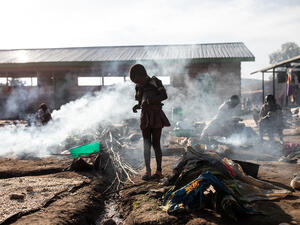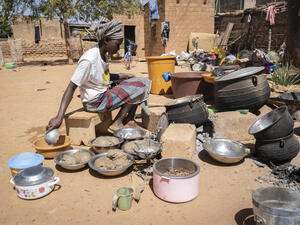Thousands newly displaced by Boko Haram in Niger
Thousands newly displaced by Boko Haram in Niger

A makeshift refugee shelter beside the highway east of Diffa, Niger.
GENEVA, Jan 19 (UNHCR) - The UN Refugee Agency and its partners are struggling to help an estimated 100,000 people driven from their homes in recent weeks in south-east Niger's Diffa region in attacks launched by Nigeria's Boko Haram insurgency group.
UNHCR's team in Niger reports that the situation is very serious with acute shortages of shelter and basic aid items for the displaced, including local villagers, internally displaced people from Niger and people who have been displaced several times.
Also impacted are Nigerian refugees who were staying with host families or in sites for the displaced in a 10 to 30-kilometre belt of land between the River Komadougou and Niger's Route National No.1. Some 170 villages have been left empty in the Diffa region.
"UNHCR is redirecting available resources to meet the urgent need for shelter and other assistance and call on donors for extra support to help this vulnerable population in Diffa," UNHCR spokesperson Adrian Edwards told reporters at a news briefing in Geneva on Tuesday (January 19).
Edwards stressed that officials expect more to flee the volatile border area when the dry season returns in a matter of weeks and Nigerian military operations resume in the area.
The newly displaced have sought shelter alongside Niger's National Route No. 1, which links the capital Niamey to the east of the country. The Niger army has not been able to ensure protection for villages and displacement sites because they are spread over a wide area and attacks usually come at night.
Many of the newly displaced have sought shelter at Koublé, which is located some 910 kilometres east of Niamey on National Route No. 1 and normally has a population of just 300. A UNHCR team visited last week and found a mixed population of Nigerian refugees, local villagers and internally displaced people.
The local government had recently conducted a provisional registration at Koublé and put the number of displaced who have arrived there since November 2015 at more than 10,000 people from 20 villages, including Nigerian refugees who have fled their homes since 2013.
In Koublé, like elsewhere on a 100-kilometre stretch of Route No. 1, people are living in makeshift shelters alongside the highway. Newly arrived families have few sanitation facilities and have to walk far to fetch water from distribution points.
Humanitarian aid partner, Médecins Sans Frontières, is providing health care and sanitation but needs more support. And many children are unable to attend school. While the World Food Programme is currently meeting food demand in the Diffa region, there is urgent need for other assistance, particularly adequate shelter.
"Help is needed urgently and UNHCR has offered to conduct a more comprehensive registration that will make it easier to determine needs, especially as many refugees and locals have been displaced several times in recent months and may have been counted twice or not at all," Edwards said.
Providing assistance and shelter is all the more difficult because people are living in spontaneous sites rather than in a camp environment, where security is tighter and access to water, health care and sanitation facilities easier. At present, UNHCR and its partners are facing difficulties coping with the needs.
The conflict in north-east Nigeria has forced more than 220,000 people to find refuge in neighbouring countries since 2013, including 138,300 in Niger (Nigerian and Niger nationals). Over 2.2 million people are also internally displaced, mainly in Adamawa, Borno and Yobe states. In Niger, insurgent incursions had displaced an estimated 50,000 people within the country, but this figure is now likely to change.
UNHCR's Niger operation is 49 per cent funded with US$24.9 million received against overall requirements of US$51 million.








